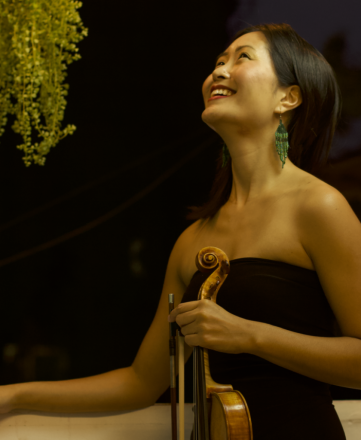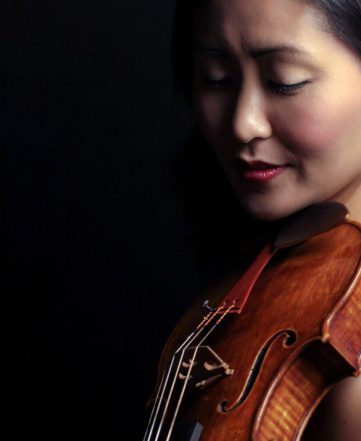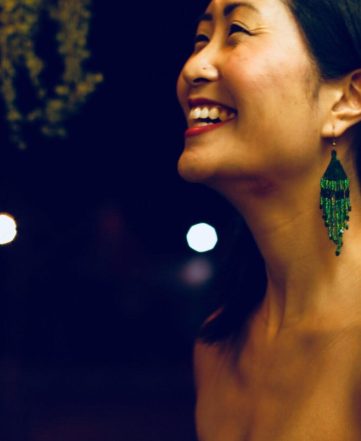Wholistic Healer Spotlight:
Sarah MeeRan Cave
Sarah MeeRan Cave is a Korean adoptee and professional, international artist and educator who began violin studies at the age of three. Since, her journey has never ceased, as music became the means through which Sarah came to know herself.
Sarah continues to explore the intersection of healing and music, as music continues to contribute to her resilience and inner confidence. She offers sound-healing consultations through her method, SoundBar, which uses the intuitive power of music to promote wellness for the client’s highest good.
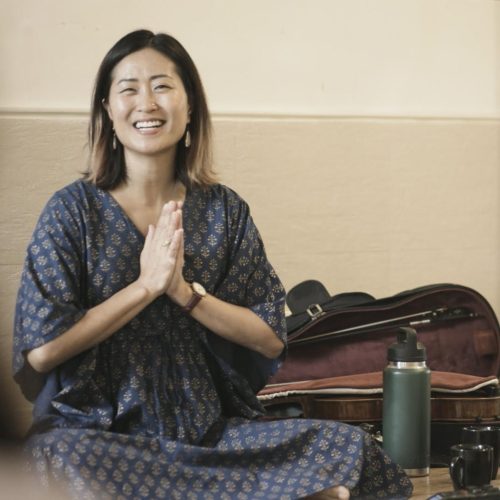
A Conversation with
Sarah MeeRan Cave
IAMAdoptee interviews Sarah MeeRan Cave, adopted from South Korea as she shares her journey of healing through music and sound
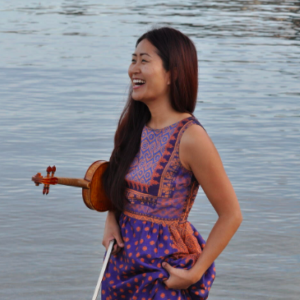
What is your name?
Hi! My name is Sarah MeeRan Cave.
How do you identify yourself?
There are many layers to identity. Outer markers include Korean-American, adoptee, woman, foreigner, woman of colour, only daughter, and an anomaly of sorts. As I move internally, I discover: artist, healer, violinist, composer, and educator. Deeper still, I feel the connection to earth, the powerful divine feminine within, a river of creativity, and the free spirit I am– always in motion, always urging to go deeper.
Where were you adopted from and when? If you would like to briefly share any aspects of your life before adoption, please do.
I was adopted at eleven weeks old, from SWS in Seoul, to two parents in Connecticut, USA. Clear memories escape me pre-adoption, but I have always had a faint almost-reverie that includes an image of my birth mother holding me in her arms, just after my birth. Somewhere in between a film and a snapshot, the image framed in my mind is coloured by a rose hue, as if everything had a pink undertone. It was only later in my adult years, after volunteering at SWS, that I learned volunteers actually wore pink robes. I remember wondering, perhaps I did not make up the entire memory– that part of my birth mother and I rest in that gently moving scene; we can live untouched there, softly wrapped in pink, swaying safely together.
I came to the US with paperwork, a case number, and a Korean name, Shin Mee-Ran. Growing up, I fantasized my name was a gift from my birth mother. By her naming me, it meant that She was both real and I was valid. In my early twenties I discovered that ‘MeeRan’ was actually given to me by my care-nurse before my adoption; however, I also learned that Shin is the real last name of my birth mother. My adoptive parents thoughtfully made MeeRan my legal middle name so I could use it easily if desired. Now, I appreciate that my name represents the integration of my Korean mom/roots and my adoptive mom– with ‘MeeRan’ being the literal link between my American first name and last name. Funny how a name can at once mean nothing and everything…
What is sound healing? And what motivated you to learn and want to deepen your practice?
I first landed in sound healing because I always felt on some level I was a healer. And for years, friends and audience members would tell me after violin performances how much my music touched them. I’ve always been an intuitive empath and also deeply connected to music and holistic healing. Launching SoundBar in 2020 was a first step in a vision towards building an effective energetic and musical healing method uniquely mine.
Sound healing is an umbrella term that could refer to any healing modality that uses the power of vibration beneficially. When any note is struck, it carries with it an entire vibrational family of notes, called overtones. These overtones are also present in us and when activated through resonance, they often rebalance and calibrate our systems (physical, emotional, energetic). My practice further incorporates actual improvised music on violin, viola, voice, and sometimes drum, as well as integrates light energetic touch to ground the body. As my Indian Classical teacher once told me, “Attention and intention is everything”. My sessions start with attuning the key of every client and bowing to their highest good. (Just as people have different personalities, so do harmonic keys). Holding them in light, I empty myself and let the music move through me, through them. I do more than playing series of notes which ‘feel good’. Rather, I call upon 34 years of musical training to sensitively execute improvised melodies while holding a safe space.Often I feel these musical lines do not originate from my own doing, but from the client’s soul, guides, or even ancestors passing on gifts. I also make customized packages or albums for clients to listen to in their own time.
These days I am experimenting to include a sequence of light, safe touch inspired by craniosacral therapy holds and energy work. This helps deepen the effects of the sound healing. Just like one doesn’t have to understand the science behind a massage to enjoy, the same goes with SoundBar. Sometimes my sessions are just like pulling back the curtain: It could be the one change that helps prompt the client’s system over the threshold into a more balanced, peaceful equilibrium.
I enjoy practicing sound and energy work because it grounds me and deepens my own inner trust and compassion for others. It also dovetails my passions for composing and teaching. Music is the most potent form of healing for me, and in one note I can feel more alive and grounded than after ten talk therapy sessions.
Are there specific programs you are creating or have created for the intercountry adoptee community?
At IKAA this past June, I conducted a healing program on sound and safe touch. Through a series of grounding exercises and sound healing, I tried to provide adoptees with tools to feel held and mother themselves. The shared experience felt well-received, deeply moving, and has inspired me to cultivate future adoptee programming.
Because of my own journey, I can understand the sensitivity, vulnerability and mixed emotions often involved in the multifaceted adoptee wound. I want adoptees to feel heard and seen, to feel they can take healing into their own hands, and to invite them to feel empowered beyond the lens of adoption.
In what ways has your identity as an adoptee changed, evolved, or developed over the years?
After many years, I am grateful to have moved from feeling victimized to empowered. Growing up as the only adoptee and one of two Asian minorities in school through 8th grade, I was very aware that I stuck out. I grew up in a small town in Connecticut and it was almost exclusively White. Not belonging felt like a hole in my inside pocket. Not everyone could see my shame, but I knew it was there. I was hypervigilant, extremely sensitive, and intuitive. I dove into my art and violin studies and would lose myself in the flow. I was curious about being Korean, but did not have the tools to vocalize my questions. I was a perfectionist, and somewhere in my early twenties my vague but frequent emptiness grew into anger at the cards dealt to me. I wanted answers and I visited Korea for the first time. I traveled alone which was at the same time terrifying and liberating– I had no safety net to save me. This trip marked a major turning point, when the reliable pillars I had built in my life came tumbling down. I stopped studying violin, got a therapist, and fortuitously took a sculpture class which led to sculpting my birth mother. It was incredibly cathartic– pushing, squeezing and pounding wet earth into the shape of what I believed my birth mother could look like, all the while using my own face in the mirror as a reference. In a way, I must have birthed her. I let out intense waves of pent up frustration, loneliness, shame and victimhood. This dark period sparked a sincere intention to heal.
Over time and through deep work, I started to repair my wounds (not ‘fix’) and connect to a part of me that wasn’t affected by the storm of an adoptee identity. I could honor my Korean adoptee-ness but from a distance. Somehow I now feel I can take off the weighted coat of adoption shame. There was something beneath afterall. Through various modalities such as Family Systems Constellation work, which targets pain passed down ancestrally, I learned to deeply feel into myself and release tremendous unworthiness and shame. It also showed me that there were other factors involved in my adoption, some karmic, and that I chose this path– adoption from Korea, being transported to the US, and I realized that these cards were not weights but the perfectly chosen recipe for me to learn inner strength and wholeness, no matter how untethered I may feel. I acknowledge not everyone feels like this, and sometimes I still put back on my coat of shame, but honestly, this change in perspective has greatly liberated me because I now feel on the soul level that I chose my life scenarios, my origin story. Only through these hardships have I learned to feel deeper, beyond my story and conditioning. It is the same perspective which invites me to see beyond black and white, good and bad. It is in this space where we can meet each other freely. When I listen inwardly, I feel the merging of these bright lights of my life– of my adoptive and Korean parents, my softness and my wildness, my stillness and my roaring voice for truth. It is all okay. Is there a Korean yin-yang? If so, I feel that.
Are there any ways you have incorporated your Korean heritage/culture into your daily life?
I am practicing maintaining a balance of what it means to be Korean in my daily life. Finding specific healing modalities which resonate, including Family Systems Constellations and ancestral healing, have led me here. My Korean heritage feels like a movable piece of my totem pole– sometimes it’s at the bottom and feels sturdy and essential, while other times it tumultuously teeters in the middle, or rests on the top as a quiet lens. On the lighter end, I enjoy making gimbap and I sometimes use Korean steel chopsticks to eat more slowly, haha. I also have Kakao and the Hangul keyboard on my phone. Does that count?
Moving down the totem, there is a resounding voice whose call has ignited the idea of creating my first truly one woman show, which centers on finding belonging amidst a complex identity, and learning to ultimately find validation within. It looks at adoption from the different vantage points, exploring my changing perspectives, and also those (imagined) of my birth mother and my adoptive mother. Since my adoptive mother’s recent passing in October, the show’s rhythm is recalibrating as I grieve. It now leans more towards the mother archetype of belonging, the womb, and learning to mother oneself. It contemplates how belonging can exist alongside abandonment.
Through Family Systems Constellation work, how I experience my Korean roots and identity has significantly transformed. It is powerful medicine and allowed me to lean into the strength of my roots and acknowledge both the pain and incredible light in my ancestral lineage. In 2018 I wrote a music show called Home en Root which highlighted my nomadic life, including the adoptive journey from Korea to the US, and focused on the importance of finding home within. For me, this home is inevitably tied to the music I hold within and which is birthed through me. Debuting this show was a launching pad from which I finally publicly acknowledged and celebrated my roots, adoption journey, and life as an outlier. It also gave life to my inner voice and brought me more peace.
Lastly, since attending IKAA Seoul 2023, I have become inspired to incorporate Korean drum (buk) and gong (jing) into my sound healing practice and admittedly feel ‘very Korean’ and thank the ancestors whenever I strike these instruments. For me and for many adoptees, the journey of what it means to feel Korean continues to unfold.
Is there one book, film or movie you would recommend to fellow adoptees?
When I was in the thick of it, two documentaries stood out. One is Wo Ai Ni Mommy (I Love You Mommy) and Somewhere Between. Regarding books, Mom & Me & Mom by Maya Angelou, Primal Wound by Nancy Verrier, and I Wish for You a Beautiful Life: Letters from the Korean Birth Mothers of Ae Ran Won to Their Children come to mind. Primal Wound was extremely validating in my initial years of adult adoptee identity searching and made me feel less alone. I Wish for You a Beautiful Life was very special because it contains letters from mothers to their children who were adopted. I read it as if my own birth mother had authored them. Finally, Maya Angelou’s memoir is not about adoption, but it highlights her estranged relationship with her mother, and how it evolves over the years. She writes with such inspiring integrity.
How do you take care of yourself?
I am a huge advocate for nourishing oneself. No creative, healing work can take place if I’m running on empty. Fill your own cup before you fill others’.
First, I listen to my body and eat mostly healthy foods and enjoy being active. I also flourish with balanced routines and need to start and end the day in meditation. Stillness is essential and being in nature and hiking are sure ways for me to feel alive and whole. Since my mom’s passing, I am learning to rest and accept honoring one’s timing, not succumbing to the external pressures of ‘do more to be more’.
Also I am mindful about what I digest throughout my days. This is anything from what I watch online to the company I keep. I am incredibly lucky to have had incredible teachers and mentors who embody wholeness, peace, artistry, and compassion. And, play is so important! Besides playing and composing music, I sometimes need to explore new parts of Bombay, host dinner parties, or salsa dance. I also recently returned to my therapist and love having a place to dump and sort my feelings and not feel ashamed.
Overall I’m learning to listen more and clean my mind of clutter so I don’t waste energy on unhelpful thoughts.
Sound Healing Mini Wellness Practice
